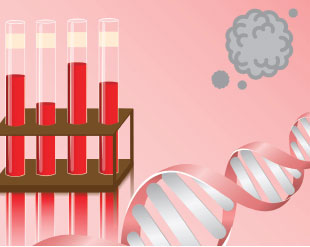 MODIFIED FROM © ISTOCK.COM/DEEPIN NETNo matter where a tumor lurks in the body, its secrets circulate in the blood. Stray tumor cells begin metastatic migrations by slipping into the vasculature. Vesicles secreted by cancer cells and free-floating DNA are also released into the bloodstream. Because these bits of cellular debris are a grab-bag of biomarkers that could both signal a cancer’s presence and predict its progression and response to treatment, the use of blood-based tests, or liquid biopsies, to detect and evaluate them is now drawing significant commercial interest.
MODIFIED FROM © ISTOCK.COM/DEEPIN NETNo matter where a tumor lurks in the body, its secrets circulate in the blood. Stray tumor cells begin metastatic migrations by slipping into the vasculature. Vesicles secreted by cancer cells and free-floating DNA are also released into the bloodstream. Because these bits of cellular debris are a grab-bag of biomarkers that could both signal a cancer’s presence and predict its progression and response to treatment, the use of blood-based tests, or liquid biopsies, to detect and evaluate them is now drawing significant commercial interest.
In January, sequencing giant Illumina announced that it was launching GRAIL, a new company that aims to develop a single diagnostic blood test for multiple cancer types. Illumina joins other big hitters such as Johnson & Johnson, Qiagen, and Roche, along with at least 30 other new companies, both small and large, in committing to develop such tests. In February, the business consulting firm RNCOS estimated that the global liquid biopsy industry could cross the $1 billion mark by 2020.
One goal of liquid biopsies is to screen for cancer before symptoms appear, as most tumors are much more easily treated in the early stages of disease. So far, only one test is approved by the US Food and Drug Administration (FDA) as a cancer ...




















